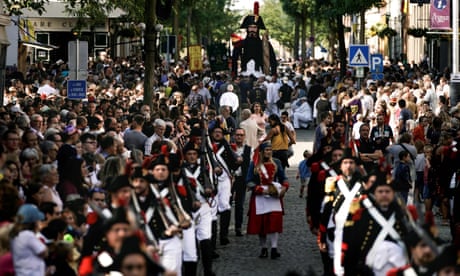WHEN ANTISEMITISM IS A TRADITION
Belgian carnival to go ahead despite row over 'hateful' antisemitism
Organisers in Aalst say they will defy calls from Israel’s government to cancel event
Daniel Boffey in Brussels
Fri 21 Feb 2020 12.49 GMTLast modified on Fri 21 Feb 2020 13.03 GMT
Shares
25

Antisemitic figures at last year’s Aalst carnival.
Israel’s foreign minister said Belgium should
be ashamed. Photograph: Pen News
Organisers of a Belgian carnival, removed from a Unesco heritage list last year following criticism of its antisemitic floats, have said they will defy calls from Israel’s government for Sunday’s event to be cancelled.
Belgium’s prime minister, Sophie Wilmès, also described the parade as an “internal affair” after Israel’s foreign minister, Israel Katz, called for the authorities to “condemn and ban this hateful parade in Aalst”.
“Belgium as a western democracy should be ashamed to allow such a vitriolic antisemitic display,” Katz had tweeted.
Emmanuel Nahshon, Israel’s ambassador to Belgium, said he hoped the organisers and local authorities would “pull themselves together”, as he clarified the minister’s remarks.

Belgian anti-racism activist forced to flee town in blackface row
“What we are asking for is absolutely not the prohibition of carnival as such,” Nahshon said. “What we are asking for is the prohibition of all these antisemitic cartoons, which become beyond good taste, which have nothing to do with a sense of humour and which do not honour an exemplary democracy such as Belgium.”
During last year’s three-day carnival in the Flemish town, floats depicted Orthodox Jews with hooked noses standing on sacks of gold coins. One of the figures was carrying a white rat on its shoulder.
Last year Unesco removed the Aalst carnival from a list of “intangible cultural heritage”, an inventory of protected practices that includes Irish hurling and Cypriot-Greek Byzantine chant.
The UN organisation said the festival, which has been on the list since 2010, had been guilty of “recurring repetition of racist and antisemitic representations”.
The carnival’s organisers had pre-empted the sanction by requesting that the event be taken off the Unesco inventory, claiming that support for its inclusion within the local community had been lost.
At the time, Christoph D’Haese, the mayor of Aalst, who is in the Flemish nationalist N-VA party, claimed his citizens had “suffered grotesque accusations … Aalst will always remain the capital of mockery and satire”.
On Friday, D’Haese said this year’s carnival, the 92nd, would go ahead as planned as he defended the freedom of expression of those involved.
“A magnifying glass is now looking at a very beautiful folk festival that has been able to take place 91 times without any significant problems,” he told a Flemish radio station. “If we can avoid sensitive issues, or visualise a theme without causing hurt, I call for that. We need to be aware of the fact that a large community may feel hurt and have respect for it. But Aalst will always remain the odd one out.”
D’Haese said that “raising awareness is one thing; forbidding and censorship is something else”. “You can focus your magnifying glass on many things, but you can also focus on the creativity that the carnivalists put into their work and on the young people who work on all those floats,” he said.
Bart Somers, a minister in the Flemish government, said the mayor “should make more efforts to enter into dialogue with the carnivalists and try to convince them that they are not acting morally and ethically”. There is expected to be heavier security around the parade.
Organisers of a Belgian carnival, removed from a Unesco heritage list last year following criticism of its antisemitic floats, have said they will defy calls from Israel’s government for Sunday’s event to be cancelled.
Belgium’s prime minister, Sophie Wilmès, also described the parade as an “internal affair” after Israel’s foreign minister, Israel Katz, called for the authorities to “condemn and ban this hateful parade in Aalst”.
“Belgium as a western democracy should be ashamed to allow such a vitriolic antisemitic display,” Katz had tweeted.
Emmanuel Nahshon, Israel’s ambassador to Belgium, said he hoped the organisers and local authorities would “pull themselves together”, as he clarified the minister’s remarks.

Belgian anti-racism activist forced to flee town in blackface row
“What we are asking for is absolutely not the prohibition of carnival as such,” Nahshon said. “What we are asking for is the prohibition of all these antisemitic cartoons, which become beyond good taste, which have nothing to do with a sense of humour and which do not honour an exemplary democracy such as Belgium.”
During last year’s three-day carnival in the Flemish town, floats depicted Orthodox Jews with hooked noses standing on sacks of gold coins. One of the figures was carrying a white rat on its shoulder.
Last year Unesco removed the Aalst carnival from a list of “intangible cultural heritage”, an inventory of protected practices that includes Irish hurling and Cypriot-Greek Byzantine chant.
The UN organisation said the festival, which has been on the list since 2010, had been guilty of “recurring repetition of racist and antisemitic representations”.
The carnival’s organisers had pre-empted the sanction by requesting that the event be taken off the Unesco inventory, claiming that support for its inclusion within the local community had been lost.
At the time, Christoph D’Haese, the mayor of Aalst, who is in the Flemish nationalist N-VA party, claimed his citizens had “suffered grotesque accusations … Aalst will always remain the capital of mockery and satire”.
On Friday, D’Haese said this year’s carnival, the 92nd, would go ahead as planned as he defended the freedom of expression of those involved.
“A magnifying glass is now looking at a very beautiful folk festival that has been able to take place 91 times without any significant problems,” he told a Flemish radio station. “If we can avoid sensitive issues, or visualise a theme without causing hurt, I call for that. We need to be aware of the fact that a large community may feel hurt and have respect for it. But Aalst will always remain the odd one out.”
D’Haese said that “raising awareness is one thing; forbidding and censorship is something else”. “You can focus your magnifying glass on many things, but you can also focus on the creativity that the carnivalists put into their work and on the young people who work on all those floats,” he said.
Bart Somers, a minister in the Flemish government, said the mayor “should make more efforts to enter into dialogue with the carnivalists and try to convince them that they are not acting morally and ethically”. There is expected to be heavier security around the parade.
No comments:
Post a Comment